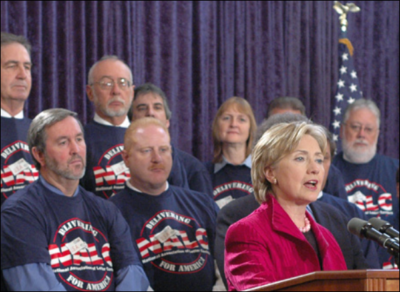U.S. Postal Service workers took a total of 2,776 days off to campaign for Hillary Clinton in 2016, the equivalent of over eight years’ worth of work based on a six day work week.
The U.S. Postal Service Office of the Inspector General issued a report this week on “the impact on local delivery routes and applicable facilities of 97 union-identified carriers who took (leave without pay) in support of union political activities and how these carriers were paid.”
Inspectors used a sampling of the carries in all seven Postal Service areas and found that in September and November 2016, they took time off ranging from four to 50 days to campaign with the union.
The 97 letter carriers were stationed at 92 different facilities across the U.S., and “78 percent of the facilities (72 of 92) were in six political battleground states where the National Association of Letter Carriers endorsed specific candidates. About 82 percent of the total LWOP for these carriers (2,264 of the 2,776 cumulative days) was used in these six states,” according to the report.
That equates to 8.86 years of work.
The National Association of Letter Carriers pointed to many of those states in announcing its support for Hillary Clinton in June 2016.
“Starting in the key battleground states of Pennsylvania, Ohio, Florida, Wisconsin and Nevada, NALC and America’s letter carriers are ready to unite behind Hillary Clinton to make the country even greater,” the announcement read.
The Postal Service policy grants “administrative discretion” in approving union leave for political activities “based on the needs of the employee, the needs of the Postal Service, and the cost to the Postal Service.”
In many instances, local supervisors denied the leave because of cost concerns and were overruled by high level bureaucrats, while others were pressured into approving the leave by union or postal management.
According to the Inspector General’s report:
In some cases supervisors initially denied the leave, but higher level managers in the district overruled them. In other cases supervisors contacted Labor Relations officials who told them to approve the leave. Finally, other managers granted these requests when provided emails or texts from union leadership or postal management validating this as a union activity or based on their prior knowledge of similar union activities. ….
Postmasters, managers, and supervisors at the facilities reviewed perceived the communications they received from Postal Service management and union officials as a requirement to approve the LWOP requests. The Postal Service has historically allowed its employees to participate in union political campaigns and has an organizational culture of supporting relationships with the union, which impacted super supervisor’s decision to approve LWOP. While on LWOP, these carriers were paid by (the National Association of Letter Carriers), which was subsequently reimbursed by its Letter Carrier Political Fund, in accordance with federal Election Commission regulations.
The union may have paid its members, but the rubber-stamped leave also resulted in a lot more overtime to cover for carriers on the campaign trail.
For just 22 facilities sampled for the report, the leave resulted in a net increase of about $90,682 in overtime pay for the perpetually cash strapped Postal Service during the months of September and October.
“The Postal Service did save $19,297 by assigning city carrier assistants (CCA) who were paid at a lower rate to cover carriers who took LWOP. However, these CCAs were not available to cover other overtime assignments at these 22 facilities and this additional overtime cost the Postal Service $109,979,” according to the report, which did not provide a total overtime cost to cover for all 97 carriers who took leave to campaign.
The Postal Service’s Director of Audit Operations Lori Lau Dillard defended the leave despite the agency chronic money problems, and denied management pressured supervisors to approve time off to campaign for Clinton.
Dillard also disputed the added cost, “since we find it to be unsubstantiated and therefore potentially inaccurate and misleading,” she wrote in a June response to a draft of the report.
Postal Service administrators determined the cost to fight the union over the issue likely would have cost more than the overtime, Dillard wrote.
“The Postal Service … believe that denial of the individual LWOP requests could have resulted in lost grievances and determinations of unfair labor practices, and may have had a negative impact on cooperative efforts with the union, which collectively could have cost the Postal Service significant amounts of money each year,” according to Dillard.
“The costs of defending against the grievances and unfair labor practice charges alone could have outstripped the amount in overtime costs identified in this report and attributed to LWOP usage by the OIG.”
Leave a Comment
COMMENTS POLICY: We have no tolerance for messages of violence, racism, vulgarity, obscenity or other such discourteous behavior. Thank you for contributing to a respectful and useful online dialogue.